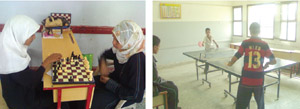
Summer centers and youths: expectations and obstacles [Archives:2008/1183/Reportage]
August 21 2008
 |
For The Yemen Times
Twelve-year-old Tawfiq Al-Mazari is missing summer center activities this year because he must work at his father's grocery in order to help his family. However, he doesn't seem at all concerned, noting that he just completed the school year and neither wants nor needs to study the same things he'll study next year.
Al-Mazari isn't the only one skipping summer center activities, which are organized by the Youth and Sports Ministry in association with the Ministry of Education, and target 300,000 Yemeni youths between ages 12 and 18 at 721 summer centers.
Although this is the fourth year, this summer's centers enjoyed particular attention from the two ministries, which allocated more than YR 4 million for their activities.
Such interest is due to Yemeni President Ali Abdullah Saleh ordering the government to pay more attention to Yemeni youths. “[Their] importance lies in filling up the spare time of youths, allowing them to move toward reading, sports and memorizing the Qur'an instead of chewing qat or doing things that are prohibited and harmful,” Saleh stated at the summer centers' July 17 launch.
He emphasized the importance of summer centers and camps “because young people are the beating heart of a nation and the future of Yemen. Our people attach great hopes to such youths.”
Sadaq Abu Ras, head of the summer centers high committee, stated to the media that their activities aim to qualify Yemeni youths educationally, culturally and religiously. “We must instill patriotism in the hearts of youths. Ethics such as national loyalty, love and loyalty to the homeland must be planted through such activities.”
Summer centers vs. extremism
To achieve these goals, the ministries circulated a curriculum to be applied at the centers, including lectures addressing youth topics such as their role in the development process, early marriage, the water crisis in Yemen, qat, smoking, female student dropouts, the negative impacts of revenge killings, Islam and moderation.
The program also contains courses for learning English language, computer skills and the Qur'an, in addition to various sporting and gaming activities like soccer, tennis, volleyball, gymnastics and chess.
Establishing these summer centers is in conjunction with the government's shutting down of various religious schools and institutes and arresting their personnel. The government alleges that such institutes were circulating negatives thoughts among youths, potentially threatening national unity.
“It's more than excellent that we should protect our students from extremism,” says Aisha Al-Dhafari, director of the Salahaddin Center, further noting that summer centers are the most appropriate venue for young people to develop their mental capabilities.
Attracting youths' attention
Due to the president's urging and the two ministries' plan, this year's summer centers have witnessed acceptable (average) attendance by youths, many of whom admit that many of the activities fail to attract their attention.
“It was so boring,” remarked Huda and Ameena, who decided to stop going to the school where summer center activities are held.
“We registered for an English course and sports, but we stopped going after a week because we were bored. The English class was boring because we had to stay in class like on study days. We had nothing special to do in sports, as the coach let us play whatever we wanted, so there was no motivation to encourage us to continue,” Ameena explained.
Lack of motivation isn't the only reason many youths are dropping out of these centers. As Kuwait Summer Center director Yahya Al-Qahira notes, “The centers' activities begin during the rainy season, so that negatively impacts attendance.”
Additionally, many centers lack facilities such as computers labs and raw materials for handcraft classes.
According to Al-Qahira, such deficiencies also have occurred at the centers during the previous three years. “Problems like providing more facilities such as computers, sports equipment and the budget each center needs should be discussed by the organizers who create these plans and programs and the centers' managers,” he suggests.
Higher girls' attendance
Unlike centers for male youths, female summer centers have witnessed notable attendance, which indicates that girls attend and commit more than boys do. “I think the intensive presence of girls is the result of their sitting at home all the time,” Al-Qahira remarks.
Regarding this higher attendance and participation, Al-Dhafari states, “This is natural because girls are always very interested in learning. They take things more seriously and last longer than boys.”
Girls' summer center activities differ from boys' centers in numerous aspects. Some centers go beyond the prescribed curriculum, adding extra activities such as embroidery, sewing, painting and other art projects, as well as learning how to cook popular Ramadan meals.
At Asma'a Summer Center, girls participate in many activities, including cultural and arts activities such as short story and poetry competitions, in addition to training to act and perform in theatrical productions.
Girls also show great interest in homemaking activities like sewing and embroidery, handcrafts and cooking.
Summer centers are held in public schools from 9 a.m. to noon and from 4 p.m. to 6 p.m.
Thus far, the outcome of these summer center activities reveals that some Yemeni youths have distinguished talents in particular fields such as painting and handcrafts. “Unfortunately, we don't have a sufficient budget to support such talent by displaying their works. We also don't have any way to encourage or train them to improve their skills,” notes one trainer at Asma'a Summer Center.
In a few days, the 2008 summer center activities will conclude. Although many Yemeni youths missed out on this year's activities, officials affirm that this summer was better than previous ones regarding youth participation and they hope that participation will be better in the future.
——
[archive-e:1183-v:16-y:2008-d:2008-08-21-p:report]


